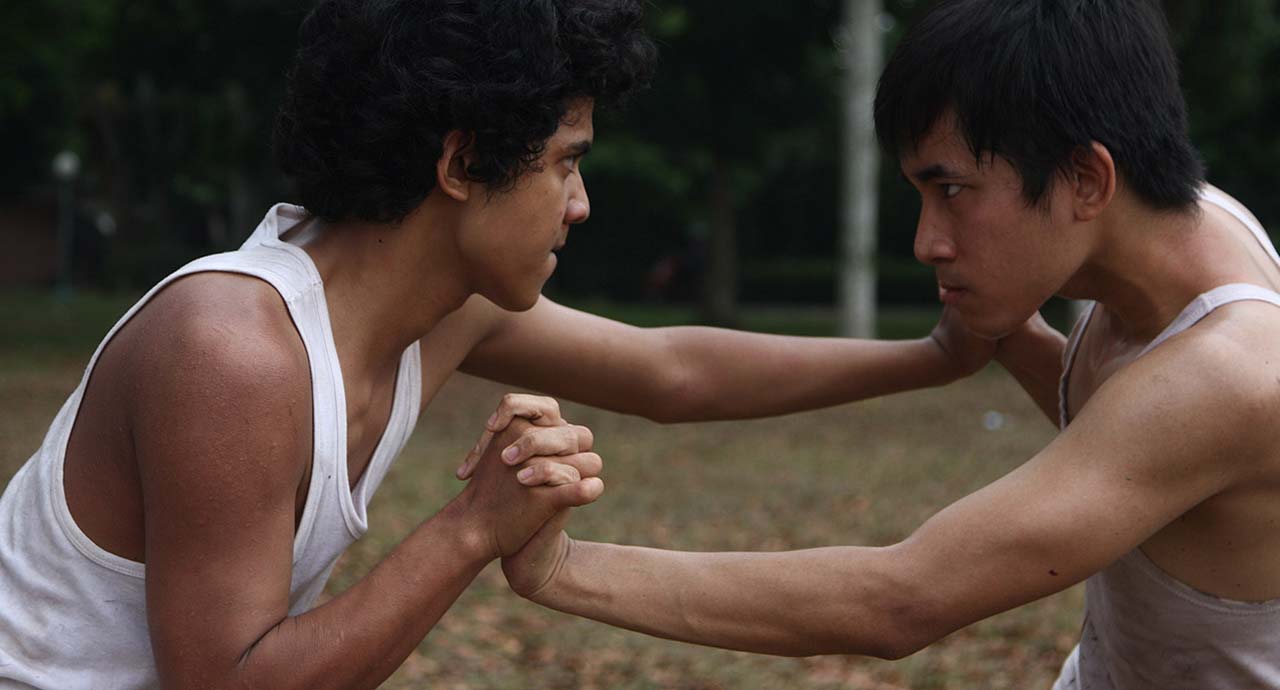Losses of Innocence: SEA Short Film Programme 4





Films in the Programme
The Fox Exploit’s the Tiger’s Might (Lucky Kuswandi, Indonesia)
Junilyn Has (Carlo Francisco Manatad, The Philippines)
The Day the Sky Roared (Jason Iskandar, Indonesia)
June in Pieces (Edward Khoo, Singapore)
Three Wheels (Kavich Neang, Cambodia)
What is innocence? Is it a construction of our own ideas of purity and naïveté? Does it depend on who we are, where we are, or who we know? How do we identify the moment in which we lose our innocence? Do we even see it coming?
The final program in the SEA Short Film Competition grapples with all of these questions. One might argue that these questions are simply the product of this program being of a more racy variety than the others, containing the only short films rated R21 in the entire selection.
However, the through-line has much more to do with the fact that each of the main characters we come to know in the program are at a crossroads in their lives, from which there is no escape; there is only a choice, and moving forward based on that choice.
It has nothing to do with age, occupation, or ethnicity. Regardless of the differences in perspectives, there is always a choice, and here we are, together as an audience, watching those choices be made.
The Fox Exploits the Tiger’s Might is perhaps the film with a title most on the nose in terms of the exposition it provides for its two primary characters. There is a fox, and there is a tiger. The two cannot remain as they are, or there would not be a film worth making — or, at least, not a good one.
Aseng, the film’s main character, spent his adolescence surrounded by abject masculinity, and arguably strives to over-sexualize himself in order to finally catch up with that train towards manhood that he has not boarded yet. He is insecure, perhaps confused about his sexuality, and feels himself falling further behind with each passing minute.
The narrative supposes that foxes are not tigers by definition, but foxes can transform and overtake tigers, for better or worse. The transformation simply requires a brashness that the innocent and weak in Aseng’s world do not have in their arsenal. So, there is a choice, and a binary: fox or tiger, innocent or not.
Junilyn Has contains a deceiving amount of depth in its oddities in structure. It decides what kind of film it would like to be from the very beginning, and is most certainly not the melodrama one would expect for a film that tackles its subject matter. That is precisely why it so strongly succeeds in its conceit.
Junilyn is no longer innocent — that much is certain. But she struggles with that loss, awkwardly stumbling through life as an exotic dancer. She has a comedic foil: a girl around her age who seems to take kindly to their chaotic life; she practices her “work” without complaint, unapologetic.
There is a villain: the girls’ caretaker of sorts, who has very little patience for Junilyn’s inadequacies and seems to lack a single sympathetic bone in her body. She lives by a code, it seems. The weak cannot survive, and the innocent cannot exist.
The Day the Sky Roared covers the tale of a historical tragedy through the eyes of two characters: a mother, and her young daughter. The film grapples with how we perceive moments of change.
It is fanciful, in a way that could be just beyond the limits of the audience’s patience and suspension of disbelief. Still, it is endearing to see the young girl construct her vision of an absolutely horrific act that, conversely, sends her mother into a tailspin.
The film toys with the idea of innocence, and the fact that it can be lost through tragedy, but ultimately, the black and white world Jason Iskandar constructs is not as bleak as it can be, but not as quirky as it wants to be. So, it is left in a confusing middle ground.
June in Pieces is an unlikely pick within this theme, and yet it fits so perfectly: a florist, who could technically be a naïve soul on the basis of his profession, is so easily corrupted by love, or even just the hope of it.
It is another black and white film, but instead harkens back to the days of a classical romantic aesthetic. The only question is: are Bonnie and Clyde a classic romance? What happens when Bonnie leaves after she’s left her mark? Love is a dangerous decision, and innocence does not tangle well with it.
There is more beauty than there is substance to June in Pieces, but the film is so well shot that you can only wish the plot matched the power of its aesthetic. There is a story here, but it is not as well conveyed as it could be.
And then there is Three Wheels, which tracks the awakening of a sad sense of nostalgia. The main character is an elderly man, far past his prime, who is mourning the life he never got to have, and the choices that he never got to make for himself.
His lack of innocence lies in the fact that his marriage is simply an act of coexistence, in which he harbors no ill will, but also harbors no affection. If elderly life crises exist, he is in the midst of one, attempting to reclaim the youth to which he’ll never rewind.
This is all a product of circumstance thanks to the film’s setting, but regardless, we mourn with him, even if we do not know it.
The innocent make their presence known in every crevice of these films, even if they do not survive as they are all the way throughout. But the very question of that survival, and the choices that permit or restrict it, is what makes this program so compelling.


